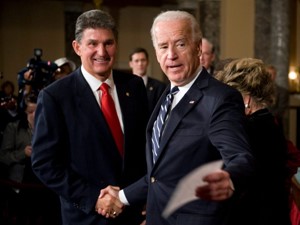
The election is over, and the dust is settling. We are now getting a clearer picture of the future, especially regarding energy policy. One of the most significant statements made in the run-up to the election was by Joe Biden when he pledged to close all the coal plants in America. This article will explore what this decision could mean for consumers and the energy crisis in general.
The first thing to note is that closing all the coal plants would significantly impact the energy industry. It is estimated that there are currently around 600 coal-fired power plants in operation in the United States. These plants provide around 30% of the country’s electricity. So, if they were all close, it would be a dramatic cost increase for consumers, which would cause an additional energy burden to the disproportionately impacted communities.
Pennsylvania has 24 plants and caught the attention of Senator Joe Manchin. The National Review Posted: “President Biden’s comments are not only outrageous and divorced from reality, but they also ignore the severe economic pain the American people are feeling because of rising energy costs,“ West Virginia, Democratic Senator Joe Manchin fired back.
“Comments like these are the reason the American people are losing trust in President Biden,” he continued, adding, “Let me be clear, this is something that the President has never said to me. Being cavalier about the loss of coal jobs for men and women in West Virginia and across the country who put their lives on the line to help build and power this country is offensive and disgusting.”
This dramatic elimination of 30% of the U.S. electrical generation is extremely short-sighted. Replace that energy with renewable wind and solar would take years, if not decades. And that is assuming the supply chain could be repaired. With the current geopolitical climate, the odds are extremely low. China is incapable of supplying enough solar, wind, and batteries to meet much of the world’s demands for renewable technology.
How this would impact the oil and gas market would be interesting. 30% of energy replacement would likely come from natural gas and oil-fired power plants. Thus, adding to the already strained oil and gas storage. For the east coast, it would mean importing more LNG from the global market at extreme price premiums. This is due to the lack of pipelines and the inter-state regulatory Jones Act. Energy costs to consumers would increase from all sides, at the pump, energy to heat homes, and delivery of goods and services.
President Biden had conflicting comments about his demands on the oil and gas market to further muddy the waters. The Wall Street Journal published several key points in response to his statements. Those points included the statistics around production and storage. The global diesel crisis is partly due to the reduction of refining capacity by three million barrels per day. Since Biden took office, two million of that reduction has been from the United States.

Refinery maintenance had taken some fuel-making capacity off the market. PHOTO: MARK FELIX/BLOOMBERG NEWS
Posted in the WSJ: “Stocks of diesel and heating oil, on the other hand, haven’t been this low at this time of year since October 1951, according to Andy Lipow, president of consulting company Lipow Oil Associates LLC, citing EIA data. Tight stocks have translated into prices sticking well above $5 a gallon this year, compared with an average of about $3.14 in 2021, according to AAA data.
The national average diesel gallon price was $5.33 on Sunday, according to AAA.
Stock depletions have been especially pronounced in the Northeast, which relies partly on diesel and heating oil for warming homes. Markets in the Southeastern U.S. also are beginning to feel an impact. Mansfield Energy Corp., a Georgia-based fuel supplier, warned customers of potential shortages last week.”
As a follow-up discussion on solutions for pain at the pump, President Biden threatened to ban exports and that the oil companies should drill more. Should the oil companies continue giving profits back to investors, they would face potential windfall profits taxes. Rigzone published the following:
“We’re going to make sure everyone knows Exxon’s profits,” he said at a press conference in Los Angeles. “Exxon: Start investing and start paying your taxes, thanks.”
Exxon responded by saying it invested heavily in the US and worked on a major Gulf Coast refinery expansion. But the narrative was clear: Biden would blame Big Oil for high gasoline prices.
The Bottom Line
This week is one of mixed news coverage. The election took up 95% of the news airtime, and the other 5% surrounded the COP27 UN renewable conference in Egypt. I will look at the fallout from that forum next week as we get information on their continued push to “Greener.”
We have seen the energy policy generated by emotions, not the economics of energy sources tied to global markets. The administration has continued to embarrass themselves and the United States on the international stage by pandering to their liberal constituents.
This was exemplified by asking the following:
- Asking the Saudis to wait till the election was over to lower production quotas. (They published his request)
- Threatening to ban all U.S. oil and gas exports.
- Continued threats to impose windfall profit taxes.
- Demands on the oil companies to increase production and cut revenues to investors.
- Demands to cut prices at the pump even when oil companies do not control the distribution channels to privately held gasoline stations.
- Constant escalation of the administration’s war on oil and gas.
- Declarations of “No More Drilling” while saying they have encouraged drilling.
While this is not even a comprehensive list of the Biden Administrations’ energy policies with direct impacts on higher prices, it will help demonstrate the patterns of complete energy policy failure.
The world is in an energy crisis. The United States is at the forefront of increasing prices to global consumers and devastating negative impacts on all markets that rely on energy. (Almost everything)
We can only focus on the things that we can impact. Educating people on the solutions to provide low-cost energy solutions is the most important thing we can do at this moment. When all energy costs increase to unstainable levels, I want to show that we tried to provide solutions.
I hope that everyone voted yesterday. It is our right to vote, and we should only be allowed to complain if we exercise our right to vote.
I want to hear your thoughts on all these key issues. If you also have any suggestions, we could use your help. Contact me at Kingoperating.com and let us know.
Check with your CPA if alternative investments are good for your portfolio.
Take the assessment and see if it is right for you HERE.
Please reach out to your team anytime for answers to your questions. Jay R. Young, CEO, King Operating
Forbes Books Author of “The Upside of Investing in Oil and Gas



